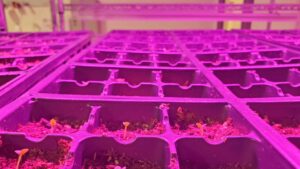
Germination presents a series of stories on the 20 most influential people in the seed sector in 2018. Want to nominate someone for 2019? Email mzienkiewicz@issuesink.com with the subject line “Top 20 nomination”!
Jason Reinheimer isn’t shy about giving his predictions on the future of western Canadian agriculture. One of those predictions is that wheat will soon overtake canola as the West’s biggest money crop.
“In the next five years we’re going to see major shifts in our wheat industry, and in cereals in general,” says the 39-year-old native of southern Australia. He serves as senior breeder for the Saskatchewan-based Limagrain Cereals Research Canada (LCRC), a wheat breeding partnership between France’s Limagrain and the Manitoba-based Canterra Seeds.
“It’s an exciting time for cereals right now. The level of private investment is increasing and with that investment comes more competition. As a whole, the industry is also more enabled than ever to develop more potential genetic combinations to increase productivity and the value of wheat in Canada. A new era in cereals is almost here.”
And as senior breeder for LCRC, Reinheimer is at the forefront of that new era. Growing up on a mixed grain farm in the land Down Under, he became enamoured with the subject of plant breeding in his teens, which led him to complete a PhD in plant breeding at the University of Adelaide. After he finished school, he went to work at a small startup called Australian Grain Technologies (AGT), now Australia’s largest plant breeding company, where he had his own breeding program at a comparatively young age.
For Reinheimer, to be a successful breeder you have to look at the world like a farmer does.
“The diversity of knowledge you need to be a good farmer, the diversity of topics you cover to be successful at farming — I can draw a strong lineage between farming and plant breeding. That’s what attracts me to it and has brought me to where I am now in Canada. My experiences farming and working with AGT have enabled me to look further abroad as to where I can have an impact and contribute.”
(Hear Jason talk about why he loves working in cereals.)
Now that he’s in Canada, Reinheimer is helping lead a mission to bring the same kind of private sector investment to the world of cereals that other big money crops like canola and soybeans have already had the benefit of.
LCRC, he says, represents a new approach to cereal breeding where the private sector is working to make wheat more than just a rotational crop for Canadian growers. Limagrain is the fourth-largest seed company in the world. To say LCRC and Reinheimer have a lot of resources at their disposal would be an understatement — but he admits that all the resources in the world don’t automatically translate into success.
“The biggest challenge for a plant breeder is taking all that research and technology and packaging it in a way that’s useful for the farmer. That’s what leads to success as a company. The challenge for the wheat industry is to find a way to enable companies like ours to be financially viable.”
Part of the key, he adds, is creating a system for value creation, so breeders in the private sector have an incentive to produce new, cutting-edge wheat varieties to benefit the farmer. That value creation discussion is ramping up, and two funding models were recently put forward by the Grains Round Table’s Value Creation Working Group.
Once that funding system is in place, Reinheimer says the foundation will be set to formally usher in that new era for cereals in Canada.
“The DNA fingerprinting technology and genome marker platforms we have access to were so expensive just a few short years ago. Since then, we’ve been able to apply those technologies to almost all the new genotypes that we develop every year. Before we test a variety in the field we can predict how it will perform in terms of yield, disease resistance and quality, and only spend our dollars on lines we know are going to be good or very good,” he adds.
“It makes our breeding program way more efficient, because testing new varieties in the field across the broad expanse of Western Canada is very costly. To focus just on which varieties we know will be successful is an unbelievable new ability to have.”
(Jason talks about his vision for the future of wheat in western Canada.)













